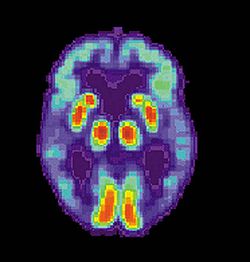Atheism and Alzheimer's disease

Alzheimer's disease is "characterised by loss of neurons and synapses in the cerebral cortex and certain subcortical regions. This loss results in gross atrophy of the affected regions, including degeneration in the temporal lobe and parietal lobe, and parts of the frontal cortex and cingulate gyrus.[1] Some of the primary symptoms of alzheimer's disease are: memory problems, mood swings, emotional outbursts, brain stem damage which impairs function in the heart, lungs plus causes disruption of various other bodily processes.[2]
The current global atheist population mostly resides in East Asia (particularly China) and in secular Europe/Australia primarily among whites.[3] See: Global atheism
Alzheimer's disease is more common among the elderly and in terms of [[global atheism and aging populations, global atheism is facing significant challenges in terms of aging populations in East Asia and Europe and atheism is expected to shrink in terms of its market share of the world's population (see: Desecularization).
Contents
Religious practices and the progression of Alzheimer's disease
WebMd reported in 2005, "Religious practices and spirituality may slow the progression of Alzheimer's disease."[4]
The abstract for the 1990 journal article Spirituality, religion, and Alzheimer's disease published in the Journal of Health Care Chaplaincy indicates:
| “ | The chaplain's ministry to persons with dementia, often of the Alzheimer's type, is vitally relevant to their clinical well-being. No chaplain should even think that because someone is demented, they can no longer be reached spiritually. While few scientific studies exist, clinical experience and anecdotal accounts suggest that selected pastoral interventions can enhance the quality of life of the mildly, moderately, and even severely demented individual.[5] | ” |
Secular Europe and Alzheimer's disease
According to Politico:
| “ | Alzheimer’s disease and related dementias are putting an enormous socio-economic burden on healthcare systems, families, and caregivers. Populations in Europe are ageing, and with this will grow the prevalence of Alzheimer’s disease. If left unchecked, roughly 9 million people in the EU are expected to have dementia by 2030 – approaching twice the population of Denmark.[6] | ” |
See also
- Atheism and the brain
- Religiosity and larger frontal lobes
- Religious individuals and thicker cerebral cortices
- Atheism and health
References
- ↑ Neurodegeneration in Alzheimer's and Parkinson's
- ↑ Alzheimer's disease
- ↑ A surprising map of where the world’s atheists live, By Max Fisher and Caitlin Dewey, Washington Post, May 23, 2013
- ↑ Religion, Spirituality May Slow Alzheimer's, WebMD, 2005
- ↑ Spirituality, religion, and Alzheimer's disease. by SG1, Whitehouse PJ., Journal of Health Care Chaplaincy, 1999;8(1-2):45-57.
- ↑ Addressing Alzheimer’s disease in Europe: What still needs to be done?, Politico, 2016